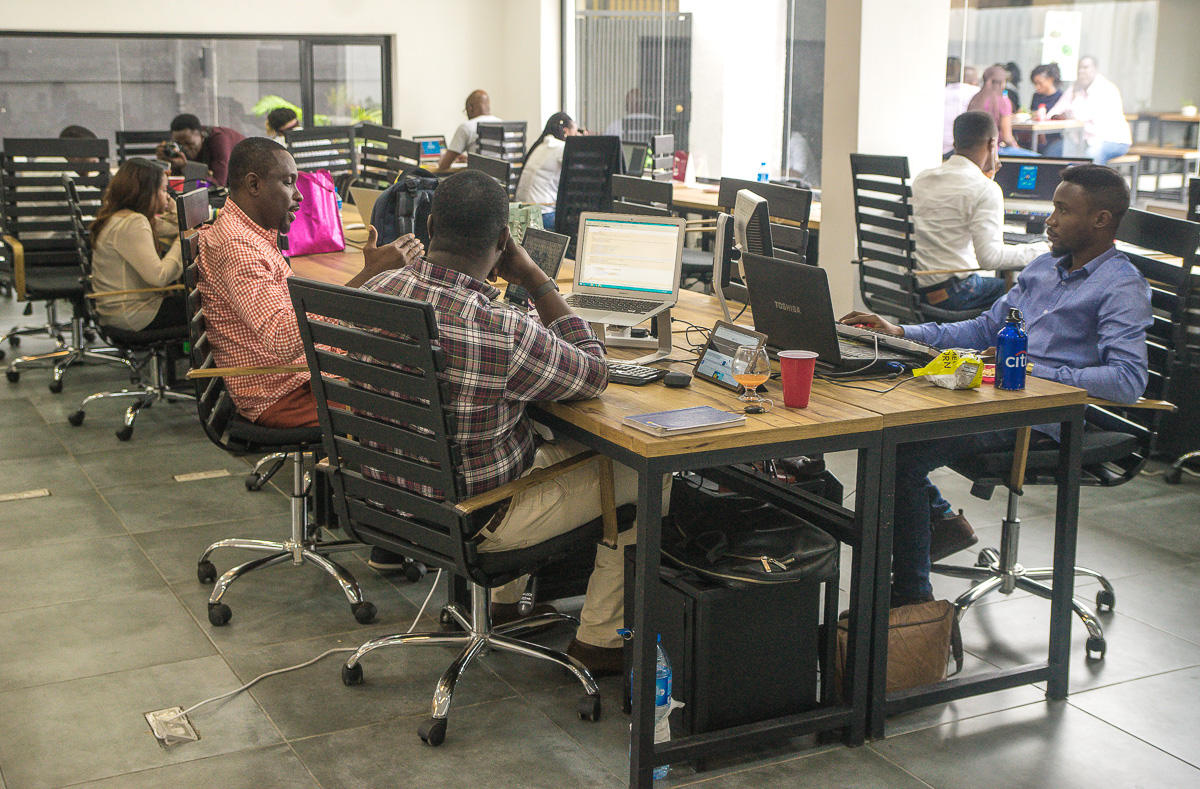For Nigeria’s Young Working Population, the Future Of Work Is All About Flexibility
Posted by E.L.E.X on February 19 2019 under Tech/Cybersecurity


A Brave New World Of Work
Over the course of my five-year career, I have been unable to get my father to understand that in doing my work, I am not just “pressing laptop”. “Why did you not go to work? Which one is you’re ‘working remotely’? You better don’t let them sack you o!”, or “Are you sure it’s not Yahoo Yahoo you’re doing?” he’d say. We have a strange understanding of my employment. He knows I work, but what exactly I do confuses him a little.
This is representative of the evolving nature of work today. There’s a dichotomy between the traditional corporate style typically employed by legacy companies and the informal, shared space variety favored by startups and other small businesses. These different approaches, though a piece of the same pie, highlight the evolving nature of work in Nigeria. As the world around us evolves, how we work reflects that evolution in the creation of new work tools and roles as well as changing job market dynamics.
The Co-Working Boom
The continued expansion of the Nigerian tech ecosystem has spurred growth in gig economy jobs and roles. Because the gig economy is a labour market characterized by the prevalence of short-term contracts or freelance work as opposed to permanent jobs, roles like “social media manager,” “user experience designer” and “digital transformation specialist” that didn’t exist just 7 years ago are now commonplace as tech-enabled businesses, brands and platforms struggle to compete for consumer attention in the ever-expanding digital space.
Entrepreneurs are also looking to innovation hubs and shared spaces to cut down on operational expenses and double down on building core products. At the same time, as Nigeria’s startup community grows, co-working and remote work are quickly becoming mainstream. According to a 2017 co-working report by Venia Business Hub, there are over 71 co-working spaces in Nigeria. In 2011, there were only 2 in the entire country, both in Lagos.
“Working from MEST Incubator Lagos instantly saves us operational costs as we don’t have to immediately rent an office, worry about electricity supply or internet, which are major start-up challenges in Nigeria,” said Dare, an entrepreneur whose startup, Chekkit, is housed at the MEST incubator in Lagos.
Florence, a product designer for payments startup Amplify, reckons the current trajectory will continue. “As more and more startups are founded, co-working and remote work will only grow more popular,” she said in a phone interview. “It’s easier to do the work, people are less stressed and more productive than if they have to spend 3-4 hours in traffic to and from work.”
Employees say remote and co-working have more advantages than traditional 9-5 jobs that go beyond ease and convenience. Some say working remotely or out of a co-working space helps them save more–and they’ve noticed a general improvement in their quality of life.
Florence, who says she saves up to 40% and is much more productive and her social awareness is better. “I used to be a very shy person in university. I didn’t like talking to people and avoided human interaction as much as possible. It’s partly why I went into tech,” she said. “But co-working has helped me deal better with that. I’ve met people in other fields and gained some knowledge of how things work in their space. If I worked in a traditional company, that might not have been possible.”
Jide, who works as a digital marketer for a startup based in Akure, Ondo State, South Western Nigeria, pointed out that his friends who are in more traditional workspaces tend to be more grumpy and less satisfied with their jobs. “This is Akure where we don’t deal with things like traffic. The rigidity of the whole thing just makes them feel less in control and they always ask me to ‘hook them up’ with jobs like mine where they can be a bit more flexible,” he said.
9-5s are Still in Play
According to one HR manager, while it makes sense for businesses with small teams to utilize the co-working or remote model, it is not a sustainable option for larger, growing companies in Nigeria. “That’s the first problem: you need more space. Also, when your business [and team] starts to grow you tend to have more clients, more meetings, more operational needs and more dynamism to how the business operates on a day-to-day basis. The remote or co-working model can’t cater to all of that sufficiently,” she said.
Does this mean digital workers of today will metamorphose into traditional workers of tomorrow? Not quite. Bisola Akinyomi, a Lagos-based freelance content writer, said working any other way would be difficult. “I don’t see myself getting into that 9-5 setup. We have lots of discussions about this amongst my freelancer friends. It’s hard to leave the flexibility of remote work and adopt to the rigidity of corporate work,” she said. “If anything, remote work is only going to get more popular and that can only mean I already have a head start.”
Ifeanyi Nwaogbo, a freelance web designer, agrees. “Even if I am going to take up a full-time role, it will still be remote or in any case, not have the rigid requirements of a regular 9-5,” he said. “At the end of the day, technology has made all the things that will require me to physically be in a place easy to do over the internet. What exactly am I giving that up for? Even if I don’t have light or my internet is bad, I can easily go into a co-working space nearby and get what needs to be done done.”
Opinions seem split on what the future of work in Nigeria will look like, but one thing is clear, people prefer flexibility in how they work, even those in traditional 9-5s. And with technologies like artificial intelligence and other forms of business automation emerging as well, the future of work just might take a completely different form. Till then, startups will most likely continue to rely on co-working spaces and remote workers while larger businesses will probably continue to retain their current structures. Like Florence says, “If you love what you do, how the work is done won’t matter.”
Tweet
YOU MAY ALSO LIKE
Comments
Add Comment
All fields are required!





















































